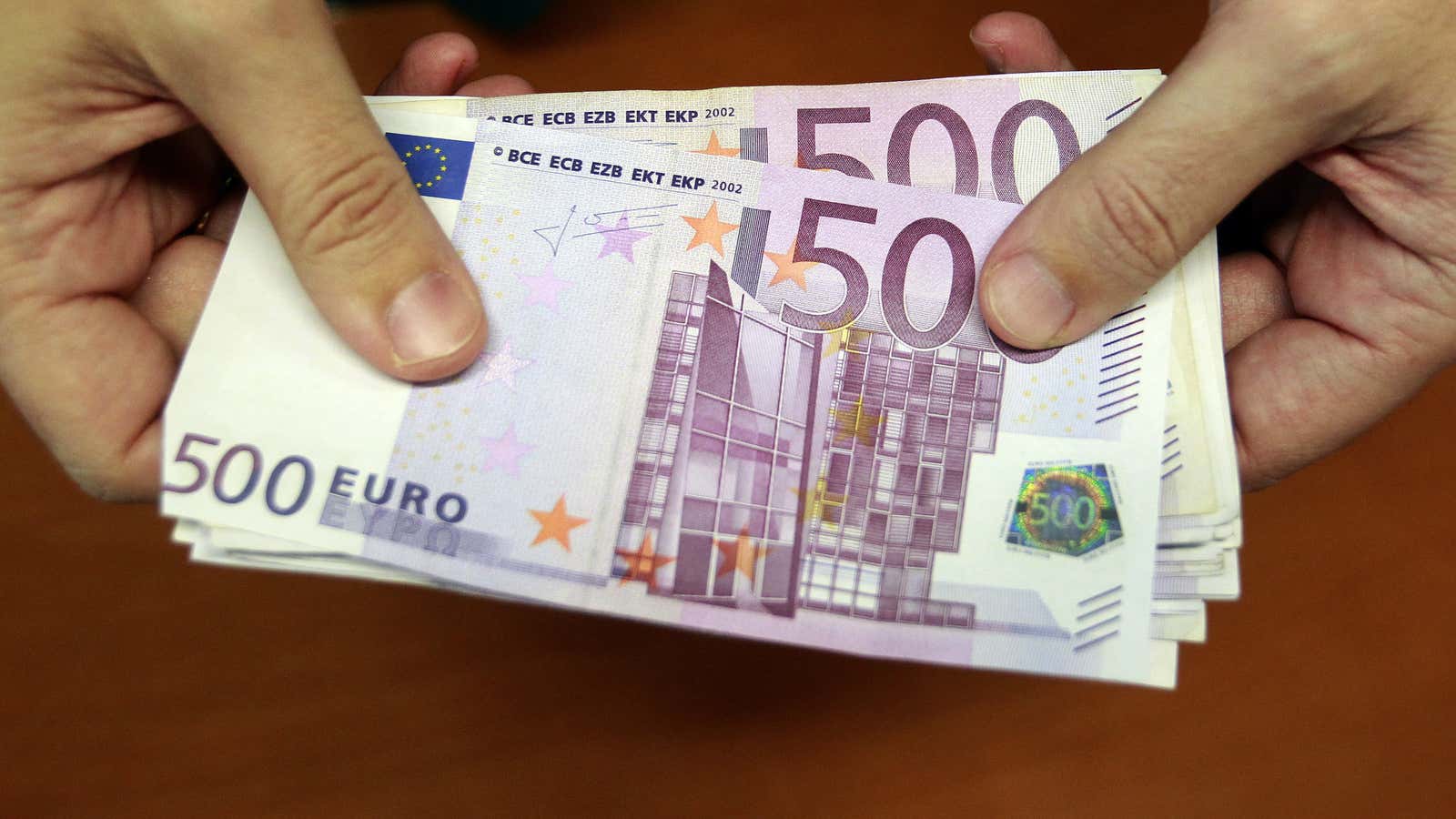For lovers of large-denomination paper money, Harvard economist Kenneth Rogoff is enemy No. 1. His book, The Curse of Cash, outlines the case for getting rid of as much of paper money as possible, and larger notes in particular, because of the role cash plays in money laundering and tax evasion.
The European Central Bank agrees with these concerns, but has moved slowly to address them. This month, most of the euro zone’s national central banks stopped recirculating the €500 note (worth about $570 at the moment). Two holdouts, Austria and Germany, will phase out the common currency’s highest-denomination note in April.
The ECB made the announcement almost three years ago, and hasn’t printed fresh €500 banknotes since 2014, but its national banks have continued accepting and redistributing the infamous note, sometimes dubbed the “Bin Laden” for its supposed role in helping finance terrorism (but rarely being seen in public). The ECB says the mega-note will always be accepted within the euro system.
Rogoff has been agitating for these kinds of changes for some 20 years. The former chief economist at the IMF says the gradual phasing out of the €500 note is “a small but constructive step, and a tacit admission that large notes are disproportionately used for tax evasion and criminal activities.” He has long argued that the main reason policymakers are reluctant to give up on cash is because they make so much money from it.
Central banks generate “seigniorage” when they print money, giving them a revenue source that arguably helps preserve their independence. But as Rogoff see it, governments likely lose far more money through cash-facilitated tax evasion and crime than they make by printing cash. He says central banks could find other ways to come up with revenue.
There are, of course, legitimate reasons to keep physical cash around. Its electronic substitutes are more traceable and susceptible to government (as well as corporate) surveillance. Some people find it easier to budget their money when they use cash. Others simply don’t trust banks, fear deflation, or want to guard against negative interest rates. If society were to move away from paper money too quickly, the elderly, poor, and homeless are vulnerable to being left behind. That’s why Rogoff says he advocates moving away from large banknotes first, rather than quickly eliminating paper money altogether.
The euro zone’s €500 notes are so valuable to the criminal underworld that they’ve exchanged hands above face value, according to a Europol report in 2015. The EU’s law enforcement agency pointed out that the banknotes weren’t often used for payments, yet still accounted for one-third of the value of all banknotes in circulation. Large-value notes are especially attractive to criminals because they make it easier to hide and transport large sums of money.
“Although not all use of cash is criminal, all criminals use cash at some stage in the money laundering process,” Europol said.
Cash use in terrorism finance is likely one of the main reasons that policymakers have cracked down on large bills. That said, getting rid of paper money is probably less useful (pdf) for preventing attacks than it is for snuffing out tax evasion. That’s because the amount of money needed to finance terrorism appears relatively small. In his book, Rogoff suggests that the funding needs for ISIS, one of the best-financed terrorist organizations, are comparatively meager compared with those of a major drug cartel.
Central banks have one more reason to be wary of paper money: interest rates have declined around the world, giving policy makers less scope to reduce borrowing costs the next time there’s an economic shock. The widespread use of electronic money could help them impose negative interest rates if needed, to jumpstart the economy during a major downturn more effectively. (Depositors pay for banks to hold their money when rates go negative, an incentive to spend or invest the funds instead.)
Even without official decrees, people in many parts of the world are giving up on cash on their own. Apps make it easy to swap money with friends, and contactless payments—which are expected to roll out widely in the US this year—are faster for small transactions than paper money. When that trend reaches an inflection point, Rogoff says central banks will be under even more pressure to get rid of large denominations like the €500 note.
“There will eventually be a tipping point,” he wrote in an email, “where it no longer becomes possible for central banks to hide behind the fig leaf of pointing to the modest legal demand for large bills.”
